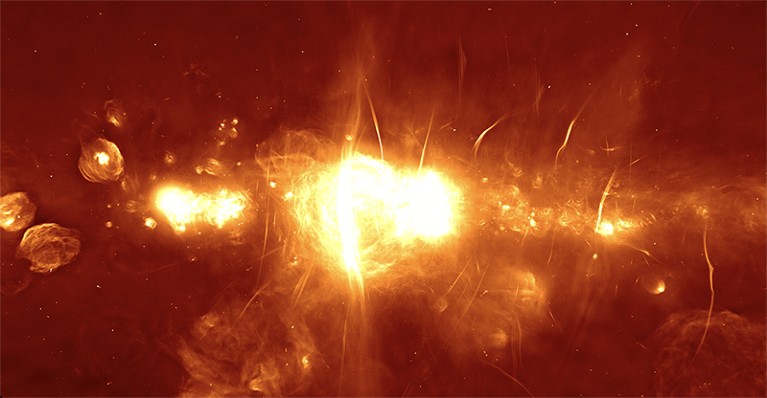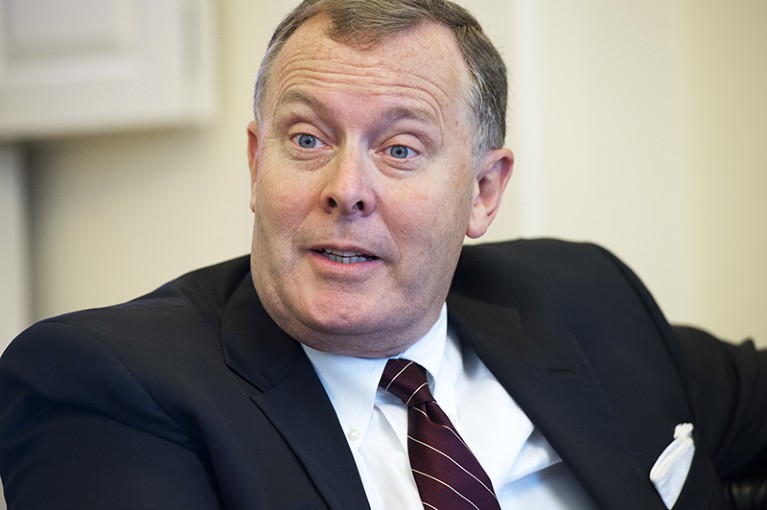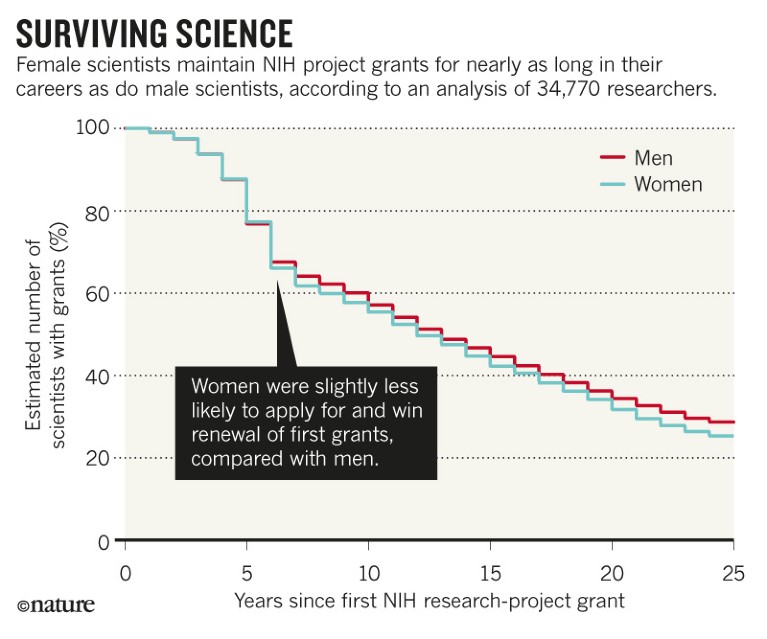EVENTS
South Africa unveils huge radio telescope This radio-wave image of the central regions of the Milky Way was unveiled at the opening ceremony of South Africa’s MeerKAT radio telescope on 13 July. The 4.4-billion-rand (US$330-million) observatory has 64 dishes, each 13.5 metres in diameter. It will observe transient astrophysical events — including fast radio bursts — and conduct surveys such as mapping hydrogen abundance across cosmic history. MeerKAT will eventually be part of the Square Kilometre Array (SKA), a facility under construction in South Africa and Australia, and it is already boosting the country’s scientific community and drawing researchers from around the world. “Back in the day, our astronomers went abroad to do astronomy. Now we’re the attraction,” says Justin Jonas, chief technologist at the Cape Town-based South African Radio Astronomy Observatory.

A view of the central region of the Milky Way based on MeerKAT observations. Brighter areas denote stronger signals.Credit: SARAO
Herbicide lawsuits A US federal judge ruled last week that lawsuits against Monsanto — an agriculture corporation based in St Louis, Missouri — can proceed. One such suit alleges that the company’s herbicide, a glyphosate product marketed as Roundup, was a substantial factor in development of the cancer non-Hodgkin’s lymphoma in a 42-year-old groundskeeper. Brent Wisner, the plaintiff’s lawyer, pointed to evidence linking glyphosate exposure among agricultural workers to cancer. Arguments for this lawsuit began on 9 July, and it is the first of many similar suits filed in the United States to go to trial. “The scientific evidence clearly shows that glyphosate was not the cause” of cancer, wrote Monsanto vice-president Scott Partridge in a statement to Nature.
Indian universities The Indian government named its first six ‘institutes of eminence’ on 9 July, with the aim of elevating Indian universities in global rankings. Three public and three private universities will each receive US$145.7 million over five years and be given greater autonomy to hire foreign faculty members and students. The government was originally due to name 20 institutions of eminence in April. Some academics told Nature the delay was because of disagreements on how to select institutions. Others have also criticized the inclusion of the Jio Institute, a private institution that has yet to be set up. “Any institution needs to be in existence and have shown its worth before being considered for institutions of eminence status,” says Subhash Lakhotia, a cytogenetics researcher at Banaras Hindu University in Varanasi.
RESEARCH
India tests crew pod India’s space agency has successfully tested a crew escape system, which puts the country a step closer to achieving human space flight. A simulated crew module weighing 12.6 tonnes, containing the unoccupied escape system, blasted off from the Satish Dhawan Space Centre in Sriharikota on 5 July. The module was propelled by seven motors that are designed to move crew members away from a threat without exceeding safe g forces. It reached an altitude of nearly 2.7 kilometres before separating from the motors, deploying its parachutes and drifting back to Earth. The module was recovered in the nearby Bay of Bengal.
Sterile mosquitoes A mosquito-control trial co-sponsored by the Google life-sciences spin-off Verily of South San Francisco, California, has passed one of its first big tests. On 10 July, Australia’s funding agency, the Commonwealth Scientific and Industrial Research Organisation, which is another co-sponsor, reported a greater than 80% reduction in dengue-transmitting Aedes aegypti mosquitoes during a five-month trial in three Australian towns in North Queensland. The trial involved releasing male mosquitoes that had been rendered sterile by infection with Wolbachia bacteria. Sterile males, released into neighbourhoods, compete for mates with other males, resulting in an eventual population reduction.
Cosmic maps A European space-telescope project that tracked the faint afterglow of the Big Bang released its final and most precise maps of the early Universe on 17 July (see go.nature.com/2jt0sbi). The European Space Agency’s Planck telescope launched in 2009 and finished surveying the cosmic microwave background in 2013, but the science team has revamped its data-analysis techniques to improve the precision of its measurements of crucial features of the Universe. The Planck data continue to predict that the current Universe should expand about 9% slower than observations of relatively nearby galaxies suggest. The telescope did not detect the signature of gravitational waves from the early stages of the Big Bang, which would point to an early, exponential expansion known as inflation, although future, more-sensitive experiments could yet find such a signature.
PEOPLE
Terrapin trouble The US attorney’s office indicted David Sommers, a Pennsylvania resident, on 10 July for allegedly poaching thousands of protected terrapins and their eggs from New Jersey salt marshes, and then selling them from his home. An investigation by the US Fish and Wildlife Service found that Sommers sold more than 3,500 diamondback terrapins (Malaclemys terrapin), a turtle species prized in the pet trade for the diamond-shaped markings on its shell, in the United States and Canada. Sommers now awaits trial for allegedly violating state and federal laws.
NASA nominee US President Donald Trump nominated James Morhard, a Senate staff member, to the number-two job at NASA on 12 July. Morhard (pictured) has degrees in business and law but no space expertise; he is currently serving as the Senate’s deputy sergeant at arms. If confirmed, Morhard would join NASA administrator Jim Bridenstine, a former politician who had reportedly been seeking a technical expert as his deputy. In a statement, Bridenstine said that “this administration is committed to American leadership in space”.

James Morhard, a Senate staff member, has been nominated for the number-two job at NASA.Credit: Tom Williams/CQ Roll Call/Getty
Mail-fraud deal A mechanical engineering professor at the University of Colorado Boulder pleaded guilty to mail fraud earlier this month. According to the US attorney’s office in Denver, Colorado, Oleg Vasilyev applied for a US$234,000 federal contract with the US Department of Energy’s (DOE’s) Los Alamos National Laboratory in New Mexico without informing the university. The funds were transferred to a university account, to which Vasilyev submitted a series of claims for unallowable expenses, including more than $140,000 for travel. In a plea agreement dated 6 July, Vasilyev agreed to repay the university $185,879; the university has reimbursed the DOE for the misappropriated funds. The guilty plea terminated Vasilyev’s employment, a university spokesperson said.
POLICY
Innovation council After Brexit, the United Kingdom will probably not be able to take part in all aspects of the European Union’s next major research funding programme, Horizon Europe, EU officials have confirmed. The European Commission’s provisional plans for the 7-year programme, which begins in 2021 and has a proposed budget of €100 billion (US$117 billion), suggested that it would be the most global yet, with many parts of it open to non-EU nations paying a subscription fee. But at the EuroScience Open Forum in Toulouse, France, on 11 July, Robert-Jan Smits, the European Commission’s special envoy for open data and former director-general of research, said that the European Innovation Council, a programme launching in 2021, will not be accessible to the United Kingdom and other non-EU ‘third’ countries because the council is aimed at supporting start-up companies in the EU. Precise details are still to be negotiated as the EU hammers out the legal framework for third countries in Horizon Europe.
Fossil-fuel vote Ireland’s lower house of parliament voted on 12 July to divest its €8.9-billion (US$10.4-billion) state-owned investment fund of fossil-fuel companies “as soon as practicable”. The upper house must now vote on the measure, but backers say that the proposal has the support of the Irish prime minister and is expected to become law. If that happens, Ireland would become the first country to set a goal of withdrawing all investments in fossil fuels. Norway is also considering whether to divest its $1-trillion state-owned fund of its holdings in fossil-fuel companies, but the government has yet to come to a decision.
Integrity inquiry The United Kingdom should establish a committee to monitor universities’ misconduct investigations, a parliamentary inquiry recommended on 11 July. The inquiry found that one in four UK universities do not comply with transparency guidelines for such investigations. The report, released by the House of Commons Science and Technology Committee, says there is a need to address the potential conflicts of universities policing themselves. Although the advocacy group Universities UK issued a concordat in 2012 that requires universities to deal with misconduct cases transparently and robustly, there are currently no sanctions for non-compliance. Some universities told the inquiry that they feared disclosing cases of research fraud would undermine their reputation.
TREND WATCH
An analysis of almost 35,000 biomedical researchers has found that after women secure their first major research grant from the US National Institutes of Health (NIH), they are almost as successful as men at netting more NIH funding. The finding casts doubt on the belief that women leave science at a faster rate than men as their careers progress. Women remain under-represented among NIH grantees, however, winning less than one-third of the grants despite earning nearly half the PhDs in the field.

Source: L. A. Hechtman et al. Proc. Natl Acad. Sci. USA http://doi.org/cr66 (2018).



